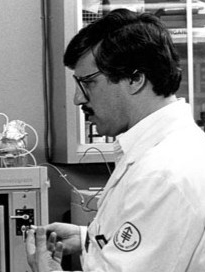T-cell activation defect in common variable immunodeficiency: Restoration by phorbol myristate acetate (PMA) or allogeneic macrophages Journal Article
| Authors: | Fiedler, W.; Sykora, K. W.; Welte, K.; Kolitz, J. E.; Cunningham-Rundles, C.; Holloway, K.; Miller, G. A.; Souza, L.; Mertelsmann, R. |
| Article Title: | T-cell activation defect in common variable immunodeficiency: Restoration by phorbol myristate acetate (PMA) or allogeneic macrophages |
| Abstract: | Common variable immunodeficiency (CVI) represents a group of familial and sporadic diseases characterized by a range of B-cell, T-cell, and macrophage defects. A defect in T-cell activation, involving reduced proliferation and IL-2 production after stimulation with OKT3 antibody, has been described previously. In the present study we found that these defects could be corrected in vitro by adding phorbol myristate acetate (PMA) to OKT3-stimulated peripheral blood mononuclear cells (PBMC) of 14 patients with CVI. PBMC of 6 out of 7 patients with CVI studied also exhibited a profound defect in IL-2 receptor expression when incubated with OKT3 antibody. IL-2 receptor expression after stimulation with PMA alone was normal, indicating that the OKT3- but not the PMA-induced pathway of IL-2 receptor expression was defective. On the RNA level, the genes for IL-2 and IL-2 receptor were expressed after stimulation with OKT3 antibody. IL-2 and IL-2 receptor gene expression were normal, indicating a possible post-transcriptional defect. To investigate whether the defect in T-cell activation was at the macrophage or the T-cell level, we prepared adherent cells and monocyte-depleted T cells (E+) from 3 patients with CVI and from normal blood donors. Incubating CVI E+ cells with normal adherent cells resulted in normal proliferation and IL-2 production in the presence of OKT3, whereas incubation of normal E+ cells with adherent cells from patients with CVI under the same conditions showed reduced IL-2 production and proliferation, suggesting the macrophage as the origin of the failure in T-cell activation in the patients with CVI studied. Inhibition by macrophage-secreted prostaglandins was excluded by failure to correct the IL-2 production and proliferation defects in the presence of indomethacin. © 1987. |
| Keywords: | adult; clinical article; human cell; t-lymphocytes; drug inhibition; transcription, genetic; in vitro study; gene expression regulation; lymphocyte activation; antibodies, monoclonal; indometacin; prostaglandin; immune deficiency; macrophage; macrophages; immunologic deficiency syndromes; t lymphocyte activation; pharmacokinetics; interleukin-2; antigens, surface; receptors, immunologic; tetradecanoylphorbol acetate; patient; middle age; antigens, differentiation, t-lymphocyte; interleukin 2 receptor; receptors, interleukin-2; drug activation; indomethacin; okt 3; human; male; female; support, non-u.s. gov't; support, u.s. gov't, p.h.s.; phorbol 12 acetate 13 myristate |
| Journal Title: | Clinical Immunology and Immunopathology |
| Volume: | 44 |
| Issue: | 2 |
| ISSN: | 0090-1229 |
| Publisher: | Elsevier Inc. |
| Date Published: | 1987-08-01 |
| Start Page: | 206 |
| End Page: | 218 |
| Language: | English |
| DOI: | 10.1016/0090-1229(87)90066-3 |
| PUBMED: | 3111766 |
| PROVIDER: | scopus |
| DOI/URL: | |
| Notes: | Article -- Export Date: 5 February 2021 -- Source: Scopus |
Altmetric
Citation Impact
BMJ Impact Analytics
MSK Authors
-
 77
77Welte -
 21
21Kolitz -
 32
32Mertelsmann
Related MSK Work



